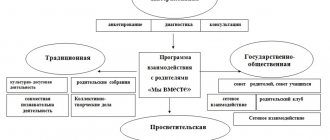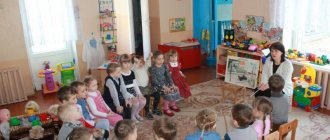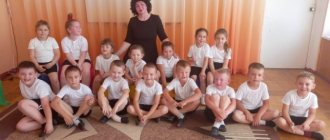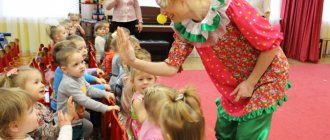Open day at the preschool educational institution “Let's live one day together”
- March 30, 2016
Competition “My Pedagogical Initiative - 2014”
Nomination “Pedagogical project in a preschool institution”
Organizing interaction with parents is a difficult job that has no recipe; some families are happy to cooperate, others categorically refuse, justifying it by being busy.
“Open Day” is an opportunity to attract parents to cooperation, interest and the opportunity to watch and participate, which is attractive to most parents. On October 22, an open day was held at our preschool educational institution. In our group, we invited parents to take an active part in organizing routine moments and to live this day not next to, but together with their children.
Project type: gaming.
Project duration : short-term (1 day).
Project participants: middle school children, teachers, parents.
The goal of the project : to create a system of interaction between adults and children by organizing an open information space for preschool educational institutions.
Tasks:
- Involving families in the unified educational space of preschool educational institutions.
- Creating conditions for effective interaction between children and parents, an atmosphere of mutual understanding, common interests, and emotional mutual support.
- Activation and enrichment of parents' educational skills in interaction with preschool children.
- Maintaining parents' confidence in their own teaching capabilities.
Hypothesis: If parents take an active part in the life of the group, then the children’s stay in the preschool educational institution will be more eventful and interesting.
Expected Result:
- parents' awareness of the need to interact at a new level of communication with the child through various types of children's activities
- building trusting partnerships between child and parent;
- active position of parents in the life of the group, kindergarten
- increasing the importance of the teacher’s role in organizing the life activities of children, increasing his authority in relationships with parents.
Project implementation stages
Preparatory stage
1. Questioning parents. Goal: Identifying the interests, needs, requests of parents, and the level of their pedagogical literacy.
2. Selection of material:
- morning exercise complex,
- outdoor games,
- fairy tale script for theatrical production,
- GCD summary for application
- attributes for outdoor games,
- role-playing game
- characters from the puppet theater "Bi-ba-bo".
3. Making invitations for parents.
Main stage
1. Morning exercises with the participation of parents.
Target:
- To promote in parents and children a feeling of joy and pleasure from joint motor and play activities;
- create a joyful, cheerful mood in children and parents;
- promote the development in parents and children of the ability to tune in to each other in joint motor and play activities;
- create a healthy family lifestyle.
2. Showing the puppet show “Masha and the Bear” by parents.
Target:
- introducing children to theatrical activities,
- developing parents’ interest in spending time together,
- developing parents’ confidence in their own teaching capabilities.
- establishing trusting relationships between parents and children.
3. Outdoor games during a walk: “At the Bear in the Forest”, “Carousel”, “Mousetrap”, “Planes”...
Target:
- show parents the impact of outdoor games on the emotional and physical development of children,
- involving parents in independently conducting outdoor games familiar to them,
- strengthening mutual understanding and cooperation.
4. Role-playing game “Family”.
Target:
- Formation of the ability, with a little help from an adult (parent), to choose a convenient place to play, organize a play environment,
- promoting the strengthening of friendly relationships,
- creating conditions for the development of free communication between adults and children during joint play activities,
- nurturing the moral qualities of children through personal example.
5. Construction games with Lego constructors.
Goal: Using joint play as a means of communication and a source of trust that strengthens the authority of an adult.
6. Joint application of autumn leaves “Hedgehog”.
Target:
- Development of creative potential of parents,
- involvement in joint creative activities
- promoting the development of children's imagination, independence and self-expression.
Open day at the preschool educational institution “Let's live one day together”
Author: Elena Alekseevna Skorodelova, teacher at MBOU No. 3 “Rucheyok”, Vyksa city, Nizhny Novgorod region.
Open day in kindergarten
Project “Open Day at MADOU Kindergarten No. 5 “Golden Key””
The theme of the Open Day is “Forms of working with children in kindergarten”
Relevance of the project topic:
“Open Day at a preschool educational institution” is one of the forms of working with parents, which provides them with the opportunity to get acquainted with the educational institution, its traditions, rules, and objectives of the educational process. And how important it is to feel the atmosphere of children’s life, to see with my own eyes the work of teachers.
Target:
Establishing trusting relationships between parents and teachers, defining the tasks of joint education of children and their implementation.
Main tasks
"Open Days" are:
- Ensuring effective interaction between preschool educational institutions and parents of pupils in order to optimize the upbringing and development of children in preschool and family settings;
- psychological and pedagogical education of parents of pupils, taking into account the individual characteristics, capabilities and needs of families;
- improving the pedagogical culture of parents;
- expanding parents’ ideas about the teaching activities of preschool educational institutions employees;
- strengthening partnerships between preschool educational institutions and parents.
Project duration:
short-term
Project implementation timeline:
March 2021
Project type:
informational, creative, educational.
Participants:
children of all groups, parents, teacher, physical education instructor, music worker.
Expected results:
Open Day is an event that allows you to obtain complete information about the conditions for keeping children in kindergarten, the organization of the regime, nutrition, walks, and developmental activities. Holding an open day allows our kindergarten to become more open to parents and the public.
For children:
This day will fill with impressions and enrich the emotional life of children.
For parents:
A preschool educational institution gives adults the opportunity to “live” a day in kindergarten. During this day, they can visit various types of joint activities between teachers and children, get acquainted with the organization and content of routine moments. The subject-developmental environment of the institution, the artistic and creative activities of students.
For teachers:
Teachers strive to show parents that the institution has created a safe, pedagogically competent and psychologically comfortable environment for the development of children and the promotion of their health. Holding an Open Day, which is united by one desire - to understand the child, help him to be himself, to reveal his uniqueness and originality. After all, it depends only on us whether the child’s life will be amazing and interesting.
Organizing an open day:
This is a means of satisfying the natural interest and curiosity of parents whose children attend kindergarten. This is, first of all, familiarization with the conditions of keeping children in a preschool institution, with the methods and techniques of the educational process, as well as overcoming the sometimes very persistent, among many parents, superficial judgment about the role of the kindergarten in the life of the child.
First of all, the content of the work on this day in each age group was thought out and planned:
Children of younger groups showed the ability and skills of self-service
It was decided to focus the parents' attention on the features of self-care: watching washing, eating lunch, and going to bed for a nap. Parents saw with their own eyes that their “helpless” children eat quickly and carefully, using a spoon correctly, and know how to drink juice and compote without spilling their clothes. They can put their clothes on the chairs and go to bed on their own. They themselves wash their hands and dress for a walk. They only need the help of adults to fasten buttons, tie shoelaces, whoever has them, adjust their hat, scarf, etc.
Teachers of younger groups offered parents recommendations on instilling independence in children, as well as on the manner of communication at home:
- There is no need to do for the child what he can do himself;
- Adults are role models;
- Pay more attention to the game at home; (types of games and the creation of conditions for their implementation were listed);
- When communicating with children, do not forget to speak polite words, demanding the same behavior from children. At home, create an atmosphere of goodwill, politeness, etc.
In the middle group, teachers showed work on the topic: “The work of 4-year-old children”
Purpose: 1. Teach children to put in order the toys located in the play corner. Wash it properly and take it to the designated place. The first subgroup of children.
The second subgroup of children helped the teacher replant indoor plants. The children were given the following goal:
- Help replant plants correctly.
- Water your existing indoor plants yourself. Learn how to put things in order in the play area and nature area.
Parents saw their children master their first working skills. It became clear to adults what kind of work children can and should be involved in at home. And the teacher introduced parents to the types of work characteristic of this age.
The senior group was shown physical education work, an open event, a walk
Target:
- Provide children with the opportunity to use motor skills and abilities acquired earlier.
- Strengthen children's physical health.
- Develop curiosity, dexterity, coordination of movements.
- To carry out a relationship in physical and environmental education between the kindergarten and the family.
- To cultivate a love for physical exercise, self-massage and the desire to lead a healthy lifestyle.
- Conversation about health. Goal: to bring children to understand the importance of cleanliness and neatness for health. Develop children's speech.
- Reading to children the work of K.I. Chukovsky “Moidodyr” Goal: to consolidate cultural and hygienic skills. Teach children to respond emotionally to the content of a literary work.
- Walk: Outdoor games: Purpose: to develop coordination and dexterity.
Didactic games: “What is healthy and what is harmful to health”
- Self-massage in bed. Walking barefoot on a massage mat. Purpose: to improve the mood and muscle tone of children, as well as to ensure the prevention of posture and foot disorders.
- Working with parents. Post a memo “List of measures that are used to improve the health of children in preschool settings” in the parent’s corner.
In the morning, the educational psychologist observed the mood of those who came. Psycho-gymnastics “Share your smile” was carried out.
Goal: to teach children to pay attention to the sad mood of others and try to help, cheer, smile. Explain the relationship between good mood and health.
Teachers of the school preparatory group worked on this day on the topic: “Preparing children for school”
Goal: To familiarize parents with the main issues of preparing for school. 2.Features of the daily routine of a future first-grader. A primary school teacher from a nearby school spoke to parents about the peculiarities of the daily routine.
Parents were shown not only the classes, but also the preparation for them. Moms and dads saw how their children seriously prepare everything they need for classes and work.
, the music directors and the children
showed their skills in singing, dancing, reading poetry, etc.
For this day, it was carefully thought out who would meet the parents and introduce them to the living conditions of the children in the groups.
- General excursion to familiarize yourself with the kindergarten premises, design, and equipment.
- Visits by parents to groups in which their children are raised.
- In the music room: speech by the head of the kindergarten on the topic: “Forms of working with children in kindergarten.”
- Introducing children's art work.
- Speech by parents on the theme of the Day.
- At the end of the Day, the children showed their skills in singing, dancing, reading poetry, etc.
As a result, parents were convinced of their children’s development, achievements over the year, etc. The development of visual arts skills was confirmed by exhibitions of children's works in each group.
Thus, the teachers drew the attention of parents to the need for systematic monitoring of the lives of their children, gave specific ideas on the issues of nurturing independence, hard work, distribution of physical activity, the importance of the ability to behave tactfully among their families, and the role of the regime in the development of preschoolers.
Parents were asked to leave their impressions of the Open Day in a notebook of reviews and suggestions, which was created for the first Open Day.




